Roof profile sheets
A large part of the surface of a building is constituted by roof profile sheets which form a part of the aesthetics of the building and protect basic structures from dampness. When choosing roofing profiles, it’s important to consider both the slope of the roof and the general view of the house.
Four types of roof profile sheets
Trapezoidal profile sheets are the most cost-efficient profile roofing material. Its straight-lined and simple design makes it an excellent choice for roofs of both industrial and office buildings. Profiles are available in a variety of heights. Note that the profile wave patterns of different manufacturers may vary.
Tile profile is characterized by the appearance of traditional roofing tile pattern typical for private residences and public buildings with double-pitched roofs. Tile profile is a roofing material which is highly valued for its aesthetic appearance and easy installation.
Classic roofing profiles resemble in appearance the rolled profile sheets but, contrary to the latter, their joints are not rolled but fastened with screws. Classic profile gives buildings the classic appearance.
Rolled profile sheets are extremely waterproof and, thanks to their straight-lined and flat surface, can be used for mounting flat roofs. Moreover, profile sheets are fastened with special clamps and all the joints are connected by rolling, which guarantees watertightness.
Choosing the right roofing profile
When choosing roof cladding profiles, one must, first and foremost, consider the slope of the roof which imposes technical constraints on the choice of profile. Low-slope roofs require wide-based profiles in order to allow the rainwater to discharge. Steeper slopes enable to use more patterned profiles.
For flat roofs, consider using rolled or trapezoidal profile sheets. Rolled, classic and trapezoidal profiles are also suitable for slightly pitched roofs. (5°–8°). To use tile profile, the slope must be at least 11°.
Roof is an important part of the general appearance of any building, which is why it is important to choose the roofing profile which harmonizes with the facade of the building and the surrounding environment.
High-quality roof profile sheets protect the building from dampness and help to design its general image. So, when choosing the profile, consider the slope of the roof, suitability of the material and the characteristics of the respective area.
WHAT IS DRIPSTOP?
DRIPSTOP is a cost-effective way to deal with condensation on uninsulated roofs. This is a self-adhesive material applied to the inner side of a metal sheet before profiling it.
DRPSTOP can be used for a variety of applications (structures) where condensation is a problem.
Trapezoidal profile 20
- Effective width: 1100mm
- Profile height: 20mm
- Minimum slope: 1/5 ( 11°), double side lap 1/7 (8 °)
- Minimum length: 1000 mm
- Recommended maximum length: 8000 mm
- Thickness: 0,45mm, 0,50mm, 0,60mm
Coatings
- Aluzinc 185+SPT: 0,45mm, 0,50mm
- DX51D+Z350: 0,50mm, 0,60mm
- Matt polyester: 0,50mm
- Polyester: 0,45mm, 0,50mm
- PUR: 0,50mm, 0,60mm
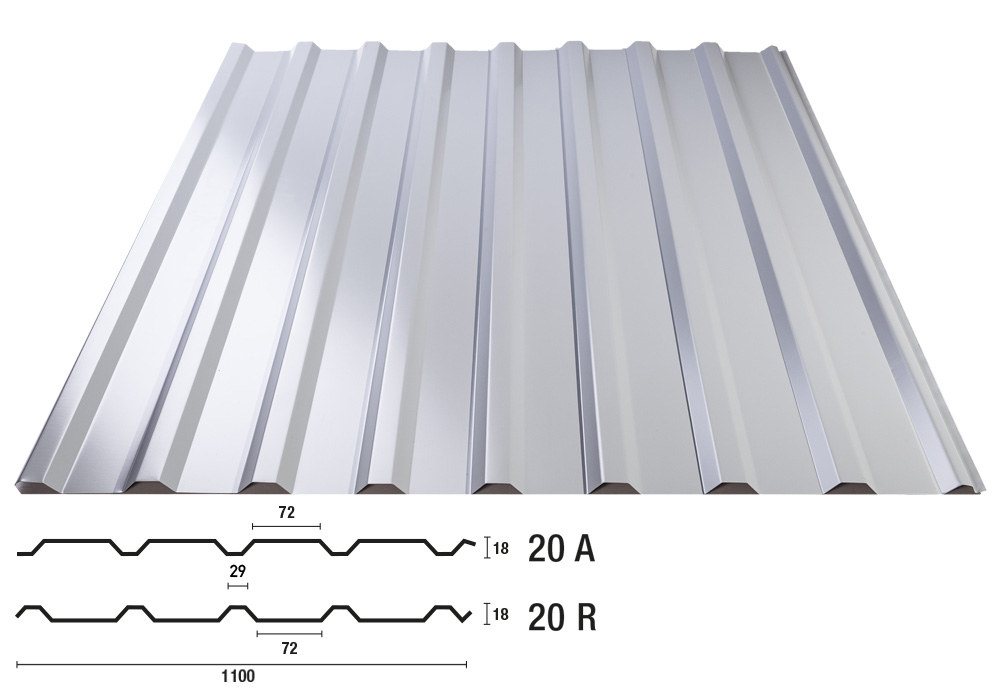
Available with DRIPSTOP anti-condensation membrane
Tile profile sheet 350
- Effective width: 1100mm
- Wave length: 350mm
- Wave height: 16mm
- Profile height: 40mm
- Minimum slope: 1:4 (14°)
- Minimum length: 860 mm
- Recommended maximum length: 9000 mm
- Thickness: 0,45mm, 0,50mm, 0,60mm
Coatings
- Matt polyester: 0,50mm
- Polyester: 0,45mm and 0,50mm
- PUR: 0,50mm and 0,60mm

Tile profile sheet Ekstra 400
- Effective width: 1100mm
- Wave length: 400mm
- Wave height: 24mm
- Profile height: 48mm
- Minimum slope: 1:5
- Minimum length: 860 mm
- Recommended maximum length: 9000 mm
- Thickness: 0,45mm, 0,50mm, 0,60mm
Coatings
- Matt polyester: 0,50mm
- Polyester: 0,45mm and 0,50mm
- PUR: 0,50mm and 0,60mm

Classic profile 25
- Effective width: 515mm
- Profile height: 25mm
- Minimum slope: 8°
- Minimum length: 1000 mm
- Recommended maximum length: 9000 mm
- Thickness: 0,50mm, 0,60mm
Coatings
- Aluzinc 185+SPT: 0,50mm
- DX51D+Z350: 0,50mm, 0,60mm
- Matt polyester: 0,50mm
- Polyester: 0,50mm
- PUR: 0,50mm, 0,60mm
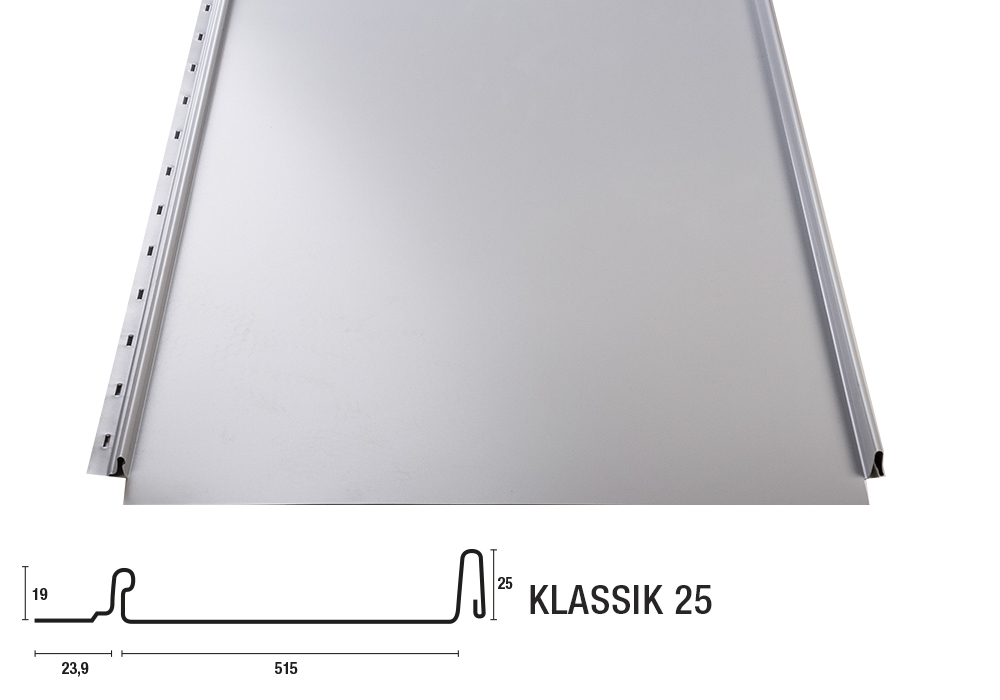
Classic profile can be ordered with ridges and eaves 25 mm. Classic profile is also available with two strengthening grooves.
Classic 38
- Effective width: 490mm
- Profile height: 38mm
- Minimum slope: 8°
- Minimum length: 1000 mm
- Recommended maximum length: 9000 mm
- Thickness: 0,50mm, 0,60mm
Coatings
- Aluzinc 185+SPT: 0,50mm
- DX51D+Z350: 0,50mm, 0,60mm
- Matt polyester: 0,50mm
- Polyester: 0,50mm
- PUR: 0,50mm, 0,60mm
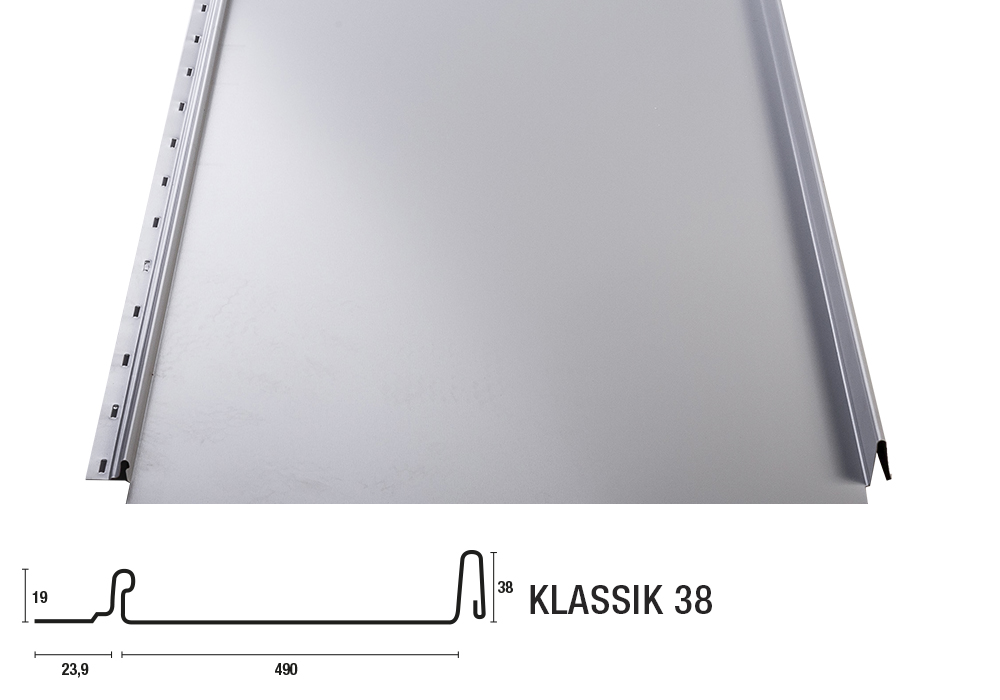
Classic profile can be ordered with ridges and eaves 25 mm. Classic profile is also available with two strengthening grooves.
Rolled profile
- Effective width: 550mm
- Profile height: 25mm
- Minimum length: 1000 mm
- Recommended maximum length: 9000 mm
- Thickness: 0,50mm, 0,60mm
Coatings
- Aluzinc 185+SPT: 0,50mm
- DX51D+Z350: 0,50mm, 0,60mm
- Matt polyester: 0,50mm
- Polyester: 0,50mm
- PUR: 0,50mm, 0,60mm
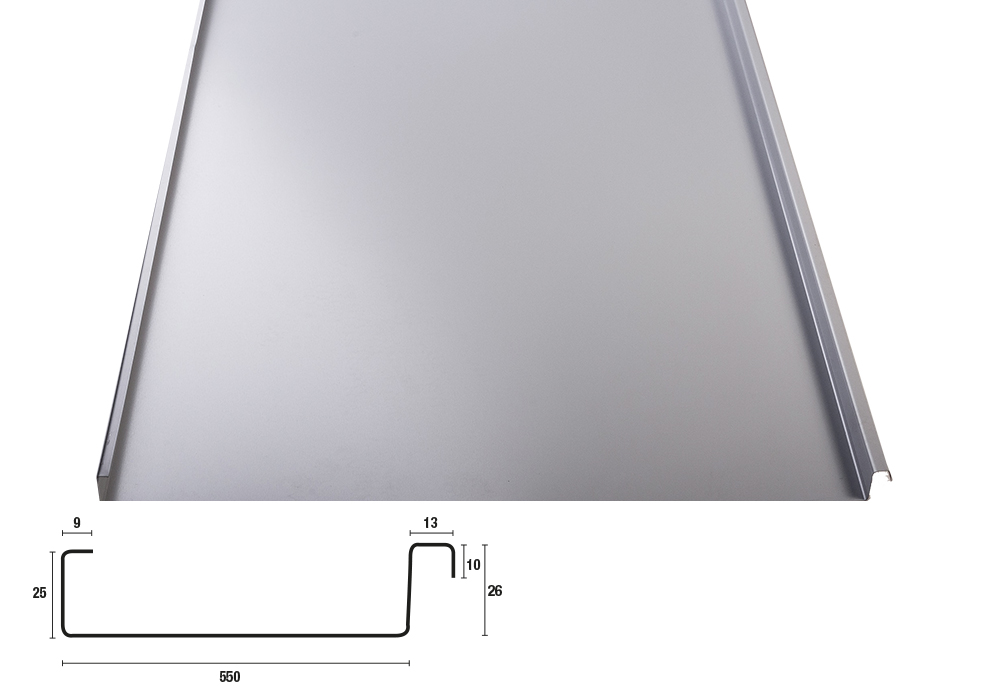
Rolled profile is also available with two strengthening grooves.
Trapezoidal profile 45
- Effective width: 900mm
- Profile height: 45mm
- Minimum slope: 1:5
- Minimum length: 1000 mm
- Recommended maximum length: 9000 mm
- Thickness: 0,45mm, 0,50mm, 0,60mm, 0,70mm
Coatings
- Aluzinc 185+SPT: 0,45mm, 0,50mm
- DX51D+Z350: 0,50mm, 0,60mm
- Matt polyester: 0,50mm
- Polyester: 0,45mm, 0,50mm
- PUR: 0,50mm, 0,60mm
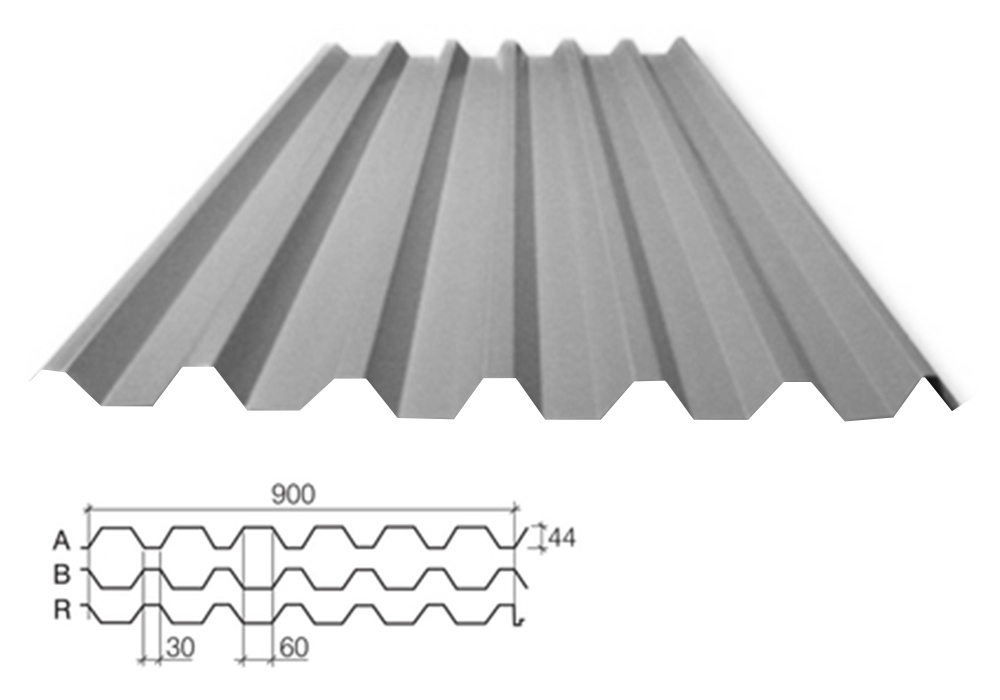
Translucent TP20
- Effective width: 1100mm
- Profile height: 20mm
- Minimum slope: 1:5
- Sheet length: 5000 mm
- Reinforcement: 450 g/m²
- Light transmission: ~80% valgusallika omast, piimjas
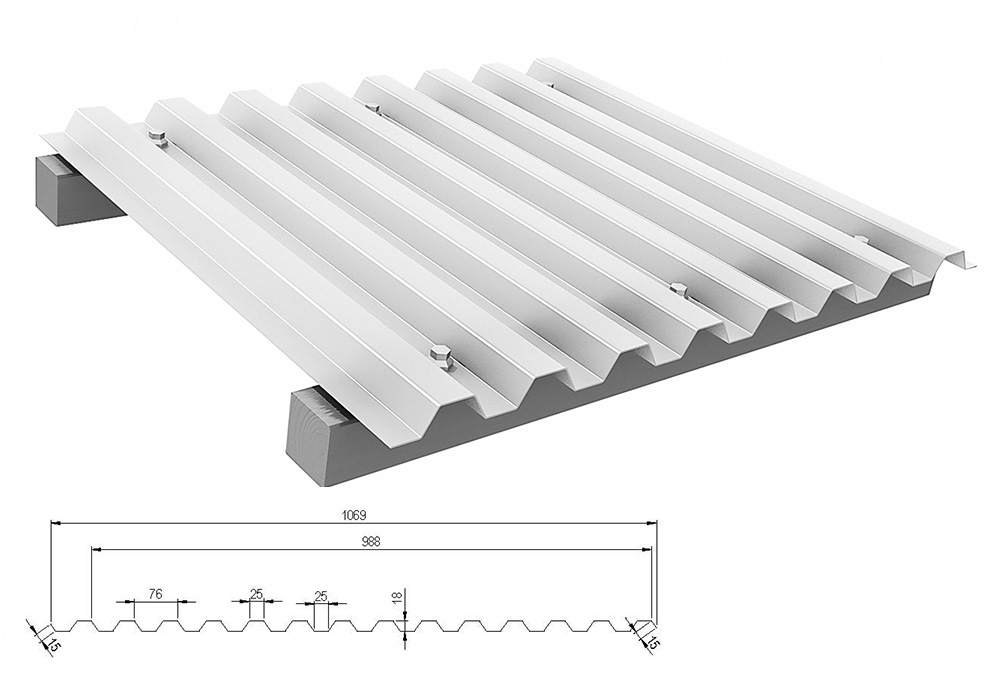
Copyright Karu Katus OÜ. All Right Reserved 2025